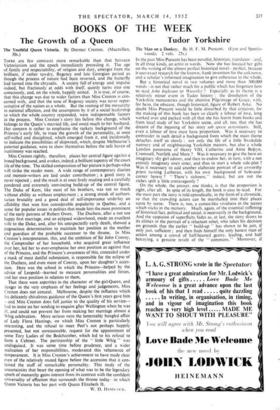BOOKS OF THE WEEK
The Growth of a Queen
THERE are few contrasts more remarkable than that between Victorianism and the epoch immediately preceding it. The age of family and respectability, of religion and duty, emerged from the brilliant, if rather tawdry, Regency and late Georgian period as though the process of nature had been reversed, and the butterfly had turned into the chrysalis. A society full of energy and impulse indeed, but fractiously at odds with itself, quietly turns into one consciously, and, on the whole, happily united. It is true, of course, that this change was due to wider factors than Miss Creston is con- cerned with, and that the tone of Regency society was never repre- sentative of the nation as a whole. But the rooting of the monarchy in national affection, and the assumption by it of a social leadership to which the whole country responded, were indispensable factors in the process. Miss Creston's story lies before this change, which belongs to the Queen's married life, and owed much to her husband. Her concern is rather to emphasise the rackety background of the . Princess's early life, to trace the growth of the personality, at once self-willed and disciplined, which emerged from it, and incidentally to indicate the possibilities of shipwreck, which, despite Melbourne's paternal guidance, were to show themselves before the safe haven of matrimony was reached.
Miss Creston rightly, therefore, places her central figure against a broad background, and evokes, indeed, a brilliant tapestry of the court life of the time. The skilled composition of her picture is perhaps what will strike the reader most. A wide range of contemporary diarists and memoir-writers are laid under contribution ; a good story is never rejected ; and the result is at once lively reading and a carefully pondered and extremely convincing build-up of the central figure. The Duke of Kent, like most of his brothers, was not so much without ability as without employment ; a strong streak of authori- tarian brutality and a good deal of self-importance underlay an affability that won him considerable popularity in Quebec, and a sense for popular issues in politics that made him the most prominent of the early patrons of Robert Owen. The Duchess, after a not too happy first marriage, and an eclipsed widowhood, made an excellent wife to the Duke, and, after his unexpectedly early death, showed a pugnacious determination to maintain her position as the mother and guardian of the probable successor to the throne. In Miss Creston's interpretation, this, and the ambition of Sir John Conroy, the Comptroller of her household, who acquired great influence over her, led her to over-emphasise her own position as against that of the Princess, and the Princess's awareness of this, concealed under a mask of most dutiful submission, is responsible for the eclipse of the. Duchess, and- even more of Conroy, upon her daughter's acces- sion. - Here was the school in which the Princess—helped by the advice of Leopold—learned to measure personalities and forces, and her own position in relation to them. That there were asperities in the character of the girl-Queen, and danger in the very emphasis of her feelings and judgements, Miss Creston does not conceal. Melbourne, despite the influence which his delicately chivalrous guidance of the Queen's first years gave him —and Miss Creston does full justice to the quality of his service— had to insist on her sending to enquire 4fter Wellington when he was ill, and could not prevent her from making her marriage almost a Whig celebration. More serious were the lamentably bungled affair of Lady Flora Hastings, on which Miss Creston is particularly_ interesting, and the refusal to meet Peel's not perhaps happily presented, but not unreasonable, request for the appointment of some Tory Ladies of the Bedchamber, which led to his refusal to form a Cabinet. The partisanship of the " little Whig " was undisguised. It was some time before prudence, and a wider realisation of her responsibilities, moderated this vehemence of temperament. It is Miss Creston's achievement to have made clear even of the relatively muted figure before the accession that it con- tained the stuff of remarkable personality. This study of the uncertainties that beset the opening of what was to be the legendary epoch of monarchy gains interest from its contrast with the confident universality of affection that surrounds the throne today—in which Queen Victoria has her part with Queen Elizabeth II.,•-
W. D. HASincock.










































 Previous page
Previous page